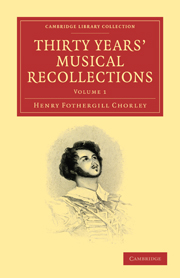THE YEAR 1838
Published online by Cambridge University Press: 29 August 2010
Summary
From the list of performances this year it will be seen how entirely Signor Rossini's star had waned. A new singer had been added to the company, by whose agency a new composer was set in the place, which he has since maintained. The singer was Madame Persiani—the composer was Donizetti.
His “Parisina,” though it was superbly acted by Madame Grisi and Signor Tamburini, did not please—his “Lucia” did.
The third new opera was Mr.Balfe's “Falstaff,” one of the many chances which this man of indisputable genius has been fortunate enough to obtain—I must add, willing to fling away.—There has been hardly a great singer in Europe, since the year 1834, for whom he has not been called on to write;—hardly a great and successful theatre in which his works have not been heard. He has the gift—now rare, in late days—of melody, and a certain facile humour for the stage, which can hardly be over-prized. His times are in our streets:—but his best works cannot be said to last.
The reason for this may be found partly in a certain unsettlement of style, not to be confounded with eclecticism; for, in spite of its being neither purely French, Italian, nor German, the operamusic of Cherubini, Spontini, or Meyerbeer, lasts in esteem. Each of the three distinguished men may be designated as “composite;”—yet each differs from each in his marked individuality. With something of his own, there is something, not so much of every country, as of every composer, in Mr. Balfe's music.
- Type
- Chapter
- Information
- Thirty Years' Musical Recollections , pp. 140 - 165Publisher: Cambridge University PressPrint publication year: 2009First published in: 1862



